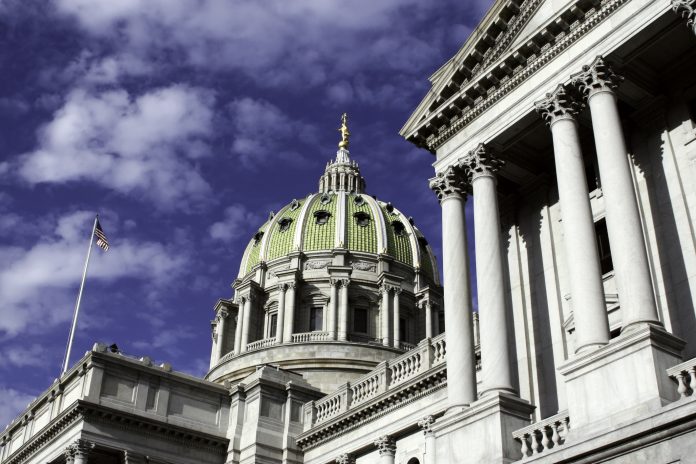By Kevin Mooney
Urgent action is needed to combat climate change for the benefit of Pennsylvania’s children and grandchildren, Governor Tom Wolf said while commenting on his administration’s Climate Impacts Assessment for 2021.
The governor claims that rising temperatures, heat waves, flooding, and sea-level rise associated with global warming will directly affect what he describes as Environmental Justice Areas deprived of investment.
As a solution, the Wolf administration has advanced rulemaking that would enable Pennsylvania to join the Regional Greenhouse Gas Initiative (RGGI) that currently includes 11 New England and Mid-Atlantic states. The initiative is built around “cap and trade” regulations that impose limits on carbon dioxide emissions from power plants.
But the governor is getting pushback. State Senator Gene Yaw, who chairs the Senate Environmental Resources and Energy Committee, calls RGGI “superficial,” counterproductive, and costly. Yaw says that Wolf’s pursuit of RGGI regulations raises significant constitutional questions since its cap-and-trade program would impose carbon taxes on Pennsylvania residents that only the state legislature can approve.
“A carbon tax is a major energy and fiscal policy initiative that – if it is to be imposed on Pennsylvania employers and ratepayers – must be approved by the General Assembly,” Yaw said in a press statement. “RGGI is a superficial fix, at best. It does very little to reduce greenhouse gas emissions, moves electric generation to Ohio and West Virginia, all while putting hardworking Pennsylvanians out of work. The RGGI initiative also creates serious constitutional questions of checks and balances between co-equal branches of government.”
In June, the State Senate passed a bill that would preclude the governor from taking unilateral action to enter RGGI without legislative approval. The bill passed by a veto-proof margin with support from six of Wolf’s own Democrats. A few days later, elected officials on the House side heard testimony from scientists and researchers debunking Wolf’s assertions about Co2 and climate change.
“The Wolf administration relies on factually incorrect assertions of ongoing and future harm from CO2-driven warming,” Gregory Wrightstone, a geologist who serves as executive director of the Co2 Coalition, told Pennsylvania House members. “Instead of relying on climate misinformation to support the imposition of a program that would destroy Pennsylvania’s billion-dollar fossil fuel industry and tens of thousands of associated jobs, the government bodies tasked with review of RGGI should ‘follow the science’ and reject this economically crippling program.”
As the economic, legal, and scientific arguments against RGGI continue to gain traction, the fallback position for Wolf is to posture as an advocate for children who will supposedly be victimized by catastrophic climate change at some future date.
But there’s a problem with these green-energy morality plays. The International Energy Agency, a Paris-based intergovernmental organization, has released a 287-page report that details the logistical and environmental challenges associated with the proposed transition from fossil fuels over to wind and solar energy, along with the batteries needed for electric cars.
As it turns out, the production of new renewable-energy platforms will require intense mining exercises to acquire the minerals like lithium, graphite, nickel, and rare-earth metals, according to the report. Such mining involves child labor in some parts of the world, such as in the Democratic Republic of Congo. Yaw seized on this reality while speaking on the Senate floor.
“If I’m sitting in a car that’s powered by an electric battery, I’d feel very guilty about that,” Yaw observed. He also told Senate colleagues that fossil-fuel critics fail to account for the waste produced by wind and solar energy. “How we dispose of solar panels and wind turbines is a huge issue,” he said.
With these facts in mind, Dan Kish, a senior fellow with the Institute for Energy Research, advises the public to be leery of political figures who make use of moral language to camouflage the real costs of their green schemes.
“When Wolf and other government officials at the state and national level make use of this moral rhetoric, they are using the decency of the American people against them to push their agenda, which always involves the same big government plans to harm average people they claim to represent,” Kish said. “When Wolf is attacking natural gas production in Pennsylvania with his regulatory schemes, he is essentially attacking the cleanest, greenest form of energy out there that has helped to generate revenue for Pennsylvania’s schools and local communities.”
Kish continued:
“Instead of supporting pro-energy policies that boost economic growth in rural parts of the state and that provide stable jobs along with reliable and affordable energy, they want to replace natural gas production with mining exercises that make use of child labor to acquire minerals that are needed to produce wind and solar energy. Since the proponents of so-called clean energy continue to make use of moral rhetoric, they ought to be called out for the impact these policies will have on vulnerable populations.”
The Pennsylvania House is expected to vote in September on its own version of a bill that would prevent Wolf from entering RGGI without a vote in the General Assembly.
Originally published by RealClearEnergy. Republished with permission.


























